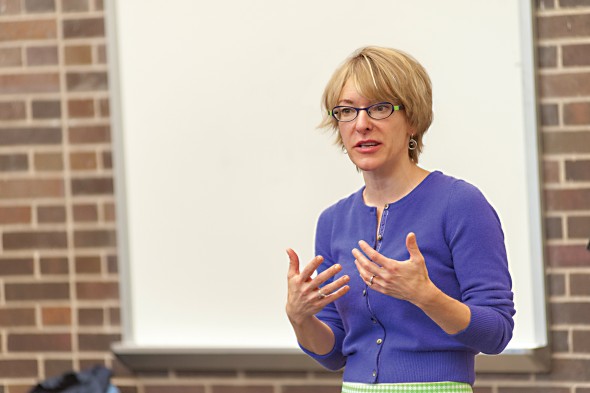Exploring human geography

“I want my students to understand how inequity comes to be, and how they are the lever to make things better as planners, activists or citizens,” says Brenda Parker. Photo: Roberta Dupuis-Devlin/UIC Photo Services
Since 1966, the Silver Circle Award has been presented to some of UIC’s best teachers. Winners, who are honored at their college commencements, receive $500 and their names join a long list of distinguished colleagues. But what makes the award especially meaningful is its selection committee: the graduating seniors.
Brenda Parker specializes in human geography: the interplay between physical space and social relations. So it’s no wonder she guides her students to empathy and a sense that they can bring about change.
“Cities are for all people, so we should be bothered when women are harassed on public transportation, for example, or when large populations live in slums or so many people of color are imprisoned,” she says.
“I want my students to understand how inequity comes to be, and how they are the lever to make things better as planners, activists or citizens. Not the government; we are the government. Our daily actions matter.”
Parker, assistant professor of urban planning and policy, teaches mostly undergraduate classes on gender, political economy, globalization, and places and institutions.
“I try to offer different ways to find passion in the work, whether it’s through discussion, debates, papers or films,” she says.
Parker’s research concerns urban homesteading — people who become self-sufficient by growing food, bartering goods and services and doing their own household projects.
“Sometimes my students raise questions that make me go back and explore,” she says. “Working with students helps me know how I need to communicate my research.”
Before joining UIC in 2008, Parker worked for AmeriCorps and taught at University of Wisconsin-Madison.
She comes by her empathy naturally, having grown up as the third of 11 children.
“There’s high energy in a household with a lot of kids, and it engenders possibilities and a sense of justice. I became open to a wide range of people and wanted to know what made them tick.”
“I really want to bring out the best in my students,” she says. “I make them work hard, but in the end, I’m proud, and they’re proud.”
